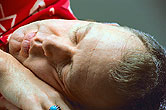
FRIDAY, Aug. 24 (HealthDay News) — Getting a good night’s sleep can help improve memory in people with Parkinson’s disease, according to a small new study.
Along with symptoms such as tremors and slow movements, people with Parkinson’s disease also can have problems with working memory, which is the ability to temporarily store and use information. Working memory is important in planning, problem solving and independent living, the study authors noted.
This study of 54 Parkinson’s patients found that they performed much better on a test of working memory after they’d had a good night’s sleep. It also found that sleep disorders such as sleep apnea can harm working memory.
The boost in working memory was linked to the amount of slow-wave sleep, which is the deepest stage of sleep, said the researchers, from Emory University in Atlanta.
Previous studies have found that slow-wave sleep is important for the ability of brain cells to reorganize and make new connections.
“It was known already that sleep is beneficial for memory, but here we’ve been able to analyze what aspects of sleep are required for the improvements in working memory performance,” study first author and postdoctoral fellow Michael Scullin said in a university news release.
The findings highlight the need to treat sleep disorders in Parkinson’s patients, and suggest that it may be possible to improve working memory in Parkinson’s patients through training, the researchers said.
The study was published this week in the journal Brain. It was supported by the U.S. National Institute of Neurological Disorders and Stroke and the National Institute on Aging.
More information
We Move has more about Parkinson’s disease.

